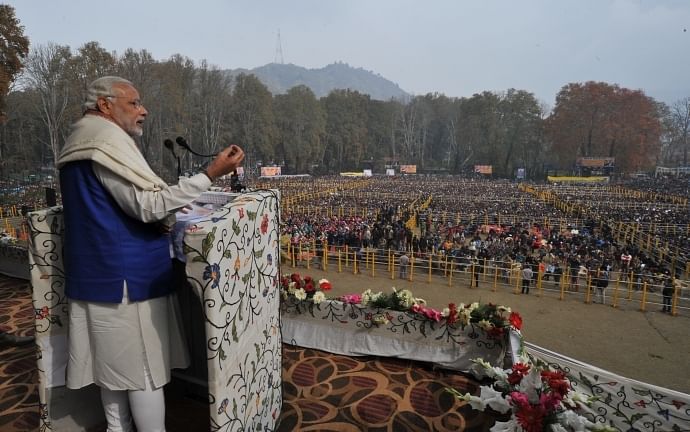At a time when the security forces have achieved impressive results in terrorist kills over the last three months, the statement surprised some observers in Kashmir.
When Prime Minister Narendra Modi uttered his now famous phrase, “ Na Goli Se, Na Gaali Se, Dil Jeetenge Kashmir Ko Gale Lagane Se” (Not by Bullets, Not by Abuse, We Will Win by Embracing all Kashmiris) it is not the first time that the concept of winning over people in an insurgency/terror-stricken area was being advocated. At a time when security forces have achieved impressive results in terrorist kills over the last three months, the statement surprised some observers with Kashmir focus.
They say the time is ripe to continue the hardline operations to eliminate the maximum number of terrorists to bring peace in the Valley. Nothing could be farther from the truth.
Letting relentless operations against the terrorists be the only strategy would be unprofessional for an organization such as the Indian Army, which understands the conflict better than anyone else.
PM Modi has demonstrated this understanding at perhaps the most appropriate time. His detractors point out that he said nothing of this kind in last year’s Independence Day address. But in 2016 when Modi spoke, it was just five weeks after Burhan Wani had been killed; the situation was still chaotic. Governments do not start advocating soft power when the chips are down.
A mix of hard and soft power is the only way forward. It happened in Northern Ireland too, when after a point the British Army took a step back, holding only the periphery and allowed economics and social aspects to play their role. Mixed schooling and the development of tourism along the Belfast waterfront were considered the prime movers.
Through the summer of 2017 the PM kept quiet, while security forces went about their jobs clinically. From the grand low they were at in March 2017, when the ratio of losses to achievements had dipped to a negative of 1:0.8, security forces came back to establish far better statistics. That indicates the return of dominance of the security space although we still have operations going on almost every day. These do appear to point to the possibility of a larger number of terrorists present, rather than the 250-300 generally spoken about.
The PM chose to speak from a position of strength. He knows that speaking to Pakistan is not something acceptable to the people of India. He has already mounted intense pressure on the Hurriyat by focusing on dismantling its financial networks. The combined strategy of security related operations (at the LoC and hinterland) and targeting of financial networks lacked one element: outreach to the people.
That is a lacuna he attempted to overcome. The PM understands that the security establishment and the political leadership in Delhi and Srinagar must get their act together to ensure that the recent successes are not wasted like before.
To do that, there must be a clearer vision and a full appreciation of the power of outreach. A group of Delhi-based strategic experts has been advocating talks with the Hurriyat, but that strategy is now dated. Others advocating waiting for an alternative, but diffused, leadership will have to wait much longer.
There is only one way. And this was tested in 2011-12 — direct engagement with the people through town hall-type meetings, and engaging with the youth separately as well. It is a model that needs to be examined for its worth. It began by arranging events with people who have rarely seen anyone come to them for a community interaction in all these years. The first step is creating hope and overcoming despair.
Victory does not lie in the domain of only crushing terrorists. The Hearts Doctrine espoused in 2011 had at its core a direct engagement with people without interlocution by any leaders. It started as small gatherings in safe areas with the army and the police providing security and administrative cover. As enthusiasm increased and a platform was available to people to express their thoughts without holding back sentiments, we found that the politicians, legislators, sarpanchs and government officials joined in as well.
It is time to return to that model, it just needs to be updated and a doctrinal touch added to it.
Lt. Gen. Syed Ata Hasnain (Retd), a former GOC of Srinagar-based 15 Corps, is associated with the Vivekanand International Foundation and the Institute of Peace and Conflict Studies. Twitter: @atahasnain53



